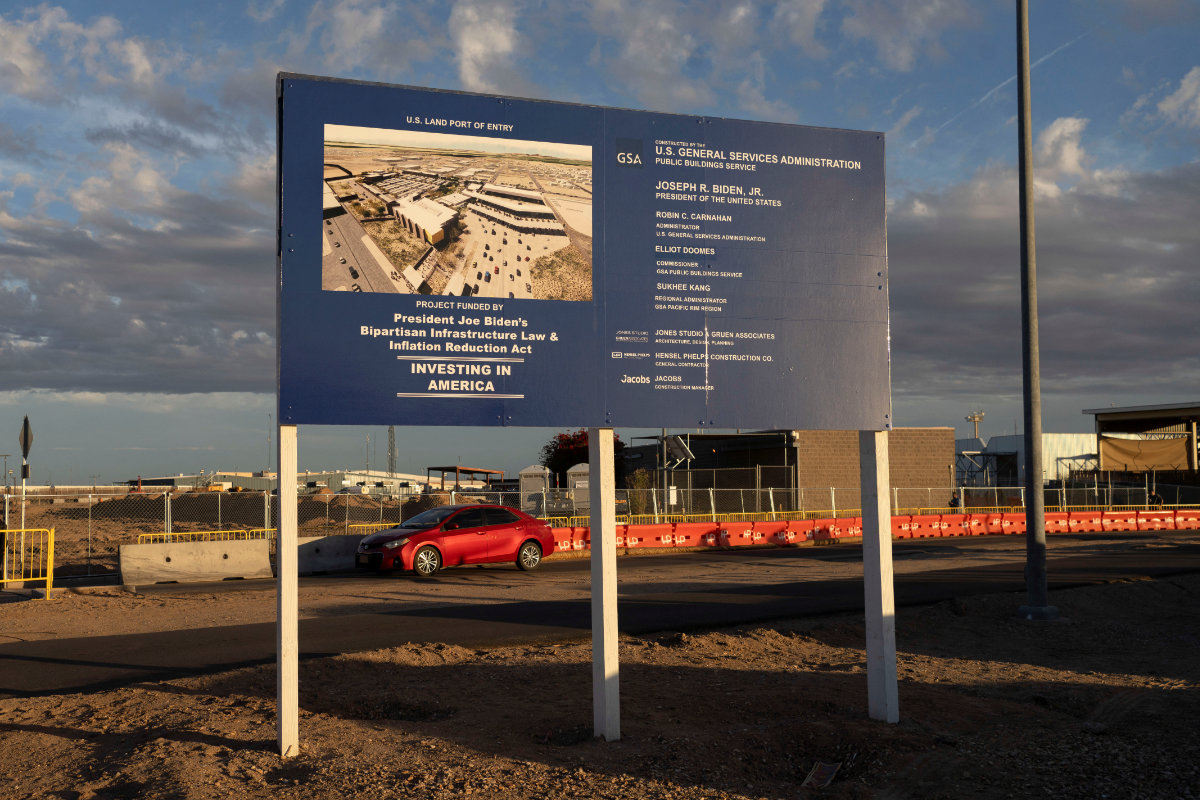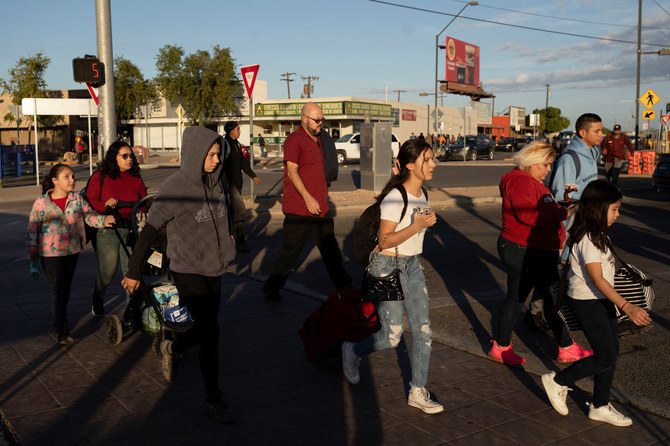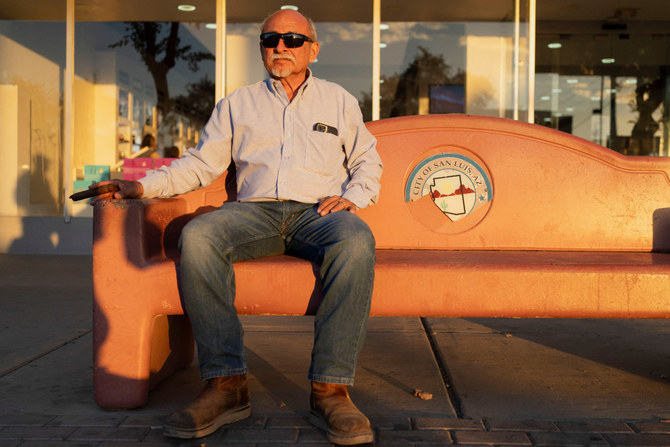SAN LUIS, Arizona: When Michele Pena ran as a Republican candidate for the Arizona state legislature in a heavily Hispanic and Democratic-leaning district on the Mexican border, few believed she could win. Pena, the daughter of a Mexican immigrant, was a school volunteer and single mother with no political experience. She began with a campaign budget of just $1,600. She nonetheless scored an upset victory last year in the district, which is separated from Mexico by miles of border wall built under former President Donald Trump to keep out “bad hombres.” “Hispanics go hard Democrat there all the time. But they saw me as a regular person, and when we got talking, a lot of people told me things aren’t going well,” the 49-year-old said in an interview from her home city of Yuma.
The predominant concerns for many voters were high food and gas prices, job prospects and the quality of schools rather than issues around minority rights, she added.
Pena’s surprise win underscores how a growing number of Hispanic voters are switching their allegiance to Trump and Republican candidates in Arizona and other election battleground states, according to interviews with five Republican and Democratic analysts.
It’s a worrying trend for Democratic President Joe Biden as he prepares for a likely general election rematch with Trump in November 2024. Hispanics, who have typically leaned Democrat, are the largest minority in the US electorate, making up almost a fifth of the population, and will play a pivotal role in a handful of swing states that will decide the election.
Take Arizona, where a tight race beckons.

A sign shows a projected visualization of the ongoing construction of the San Luis Port of Entry funded by President Joe Biden's Bipartisan Infrastructure Law and Inflation Reduction Act, in the heavily Hispanic Yuma County, in San Luis, Arizona. (REUTERS/Rebecca Noble)
A third of the population is Hispanic in the state, which Biden won by just 10,000 votes in the last presidential race. In the southwest district that Pena won last year, registered Democrats outnumber Republicans by more than 12 percent.
In 2020, Trump’s national share of Hispanic voters rose by 8 percentage points to 36 percent, compared with the 2016 election, according to the non-partisan Pew Research Center.
More recently, a Reuters/Ipsos survey of almost 800 Hispanic adults carried out this month found Trump narrowly leading Biden in support, 38 percent to 37 percent. The survey results had a credibility interval, a measure of precision, of about 4 percentage points in either direction.
“All the data we’ve seen since the 2016 elections suggests there’s considerable weakening of Democratic support among Hispanics,” said Ruy Teixeira, a veteran Democratic political analyst who has spent decades studying Hispanic voting trends.
Teixeira said Democrats have been focusing too heavily on issues including voting rights and how Trump posed a threat to democracy.
“They are dancing around the number one issue — high prices,” he added. “It’s not what working-class voters want out of a political party.”
Such assertions are supported by a November survey carried out by UnidosUS, the largest Latino non-profit advocacy group, which found that the top issues for Hispanic voters are inflation, jobs and the economy.
Democrats reject suggestions they are focusing on the wrong issues. They point to heavy investment by the Biden campaign in the 2020 election, and the Democratic Party in the 2022 congressional elections, to run ads in key states on issues including job growth and improving the economy for working families.
Knocking on doors
Pena used a campaign strategy that Republicans have been executing for several years to attract more Hispanic voters: show visibility in working-class neighborhoods, run more Spanish-language TV and radio ads, open Spanish-speaking offices, and try to convince voters that Republicans can improve their lot more than Democrats.
The Republican National Committee opened Hispanic community centers in 19 states in 2022 — including two in Arizona — where volunteers were trained to door-knock and make calls in Spanish.
In Arizona, Republicans have backed legislation they believe appeals to working-class Hispanics, including the “Tamale bill” that would have relaxed rules around the selling of food made in home kitchens. The state’s Democratic governor vetoed the measure this year on health-and safety grounds.
Pena said she knocked on hundreds of doors in working-class areas in small cities such as San Luis with a message focused on improving schools, lowering prices, and love of family. She heard worries from voters about social policies backed by many Democrats, including gender-neutral bathrooms in schools.
“They saw I was a Republican, and it was a new perspective for a lot of people,” Pena said, because few had spoken at length to a Republican candidate before.
Pena’s victory was a minor political earthquake in Arizona. Democrats expected to win both the district’s seats, which would have created a 30-30 tie in the state House of Representatives, robbing Republicans of their majority.
Pena defeated Democrat Jesus Lugo Jr. by just over 3,000 votes, 4 percent of the vote.
Democrats say they have made similar on-the-ground campaign efforts. Lugo, a social worker, told Reuters he ran on a platform of reducing homelessness, domestic violence, substance abuse, increasing mental health resources and criminal justice reform.
The 30-year-old rejects suggestions he lost to Pena due to the issues focused on. He said she won because the Republicans used a political tactic known as the “single shot“: running only one candidate in a district with two seats, increasing the chance for Republicans to win one seat rather than losing both.
Matt Barreto, the lead Latino pollster for the 2020 Biden campaign, said the playing field in 2024 will be different. He said the 2020 contest was a struggle in some areas because of the COVID-19 pandemic, when Democrats — unlike Republicans — heeded government warnings and did not campaign door-to-door or open offices in Hispanic neighborhoods.
Jason Miller, a Trump campaign spokesperson, said Trump would focus on issues important to Hispanic voters, including the economy, crime, and the southern border. “Hispanic voters will be very important in 2024,” Miller said.
Support for border wall
Democratic analyst Teixeira said his party had made a fundamental mistake in recent election cycles: assuming Hispanic voters would find Trump and fellow Republicans’ tough rhetoric against illegal immigrants as racist.
“Huge proportions of the Hispanic population, especially working-class Hispanics, are actually pretty disturbed by illegal immigration,” Teixeira said, referring to migrants crossing the border into the US without visas.
Many Hispanics do find Trump’s rhetoric offensive and vote for the Democratic Party. Most are focused on which party can best address their economic concerns, according to the UnidosUS poll.
In Reuters interviews with a dozen Hispanic voters in Yuma County, which contains part of Pena’s district, none said they found Trump’s rhetoric about illegal Mexican immigrants — whom he once described as murderers and rapists — as racist or xenophobic.
The people were focused on high prices, which most blamed Biden for. Of the dozen, six plan to vote for Trump, and the rest were undecided. Eight supported a border wall and wanted illegal immigrants kept out.
A large chunk of Trump’s border wall sits close to San Luis, which has a population of around 35,000 and is a mix of big modern stores such as Walmart and scores of small Spanish-language food and clothing shops.
Alma Cuevas, 56, a retired school librarian in the city, came to the US with her family from Mexico aged one.
An independent, she is undecided about next year’s election, but doesn’t think she can back Biden. She feels he has failed to deal with the influx of thousands of migrants across the border.
She is leaning toward Trump, because she felt better off economically when he was president.
’People feel disappointed'
Jaime Regalado, a non-partisan veteran analyst of Hispanic voting patterns and polling, echoed the complaints of some Hispanic rights groups, saying the Democratic Party only courted Hispanics at election time, assuming their support, rather than working full-time for their support.
Biden aides rejected that claim. They said his campaign had already made the largest and earliest outreach to Hispanics for a presidential re-election campaign, including Spanish-language ads targeting Latino voters in battleground states.
One ad tells voters that it’s Biden whose economic policies help Hispanic families, rather than Republicans.
“We refuse to take any vote for granted. That’s why this campaign is investing early and often to mobilize Latinos to again help deliver Joe Biden the White House,” said Maca Casado, a Biden campaign spokesperson.
They will face an uphill task convincing voters like Aracely Mendez, a lettuce picker in San Luis, who said she voted for Pena last year and will back Trump in 2024.
“People feel disappointed with the Democrats,” the 42-year-old said. “Prices went up. It’s tough.”


























